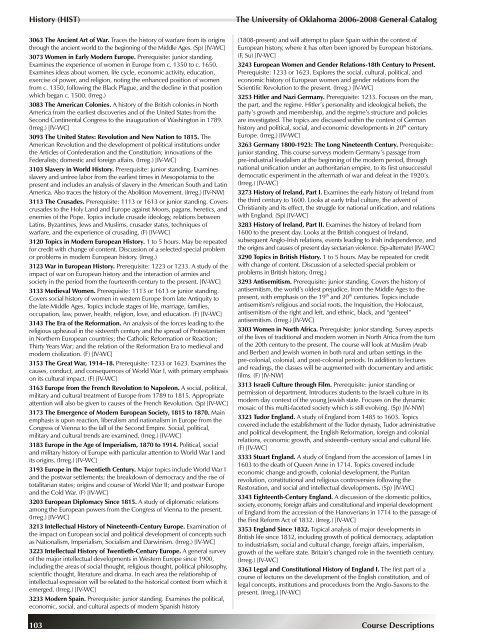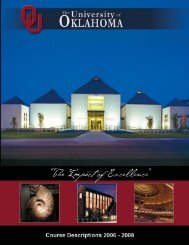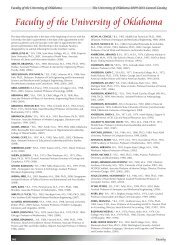2006-08 Course Descriptions - Catalog - University of Oklahoma
2006-08 Course Descriptions - Catalog - University of Oklahoma
2006-08 Course Descriptions - Catalog - University of Oklahoma
Create successful ePaper yourself
Turn your PDF publications into a flip-book with our unique Google optimized e-Paper software.
History (HIST)The Uni ver sity <strong>of</strong> <strong>Oklahoma</strong> <strong>2006</strong>-20<strong>08</strong> Gen eral Cat a log3063 The Ancient Art <strong>of</strong> War. Traces the history <strong>of</strong> warfare from its originsthrough the ancient world to the beginning <strong>of</strong> the Middle Ages. (Sp) [IV-WC]3073 Women in Early Modern Europe. Prerequisite: junior standing.Examines the experience <strong>of</strong> women in Europe from c. 1350 to c. 1650.Examines ideas about women, life cycle, economic activity, education,exercise <strong>of</strong> power, and religion, noting the enhanced position <strong>of</strong> womenfrom c. 1350, following the Black Plague, and the decline in that positionwhich began c. 1500. (Irreg.)3<strong>08</strong>3 The American Colonies. A history <strong>of</strong> the British colonies in NorthAmerica from the earliest discoveries and <strong>of</strong> the United States from theSecond Continental Congress to the inauguration <strong>of</strong> Washington in 1789.(Irreg.) [IV-WC]3093 The United States: Revolution and New Nation to 1815. TheAmerican Revolution and the development <strong>of</strong> political institutions underthe Articles <strong>of</strong> Confederation and the Constitution; innovations <strong>of</strong> theFederalists; domestic and foreign affairs. (Irreg.) [IV-WC]3103 Slavery in World History. Prerequisite: junior standing. Examinesslavery and unfree labor from the earliest times in Mesopotamia to thepresent and includes an analysis <strong>of</strong> slavery in the American South and LatinAmerica. Also traces the history <strong>of</strong> the Abolition Movement. (Irreg.) [IV-NW]3113 The Crusades. Prerequisite: 1113 or 1613 or junior standing. Coverscrusades to the Holy Land and Europe against Moors, pagans, heretics, andenemies <strong>of</strong> the Pope. Topics include crusade ideology, relations betweenLatins, Byzantines, Jews and Muslims, crusader states, techniques <strong>of</strong>warfare, and the experience <strong>of</strong> crusading. (F) [IV-WC]3120 Topics in Modern European History. 1 to 5 hours. May be repeatedfor credit with change <strong>of</strong> content. Discussion <strong>of</strong> a selected special problemor problems in modern European history. (Irreg.)3123 War in European History. Prerequisite: 1223 or 1233. A study <strong>of</strong> theimpact <strong>of</strong> war on European history and the interaction <strong>of</strong> armies andsociety in the period from the fourteenth century to the present. [IV-WC]3133 Medieval Women. Prerequisite: 1113 or 1613 or junior standing.Covers social history <strong>of</strong> women in western Europe from late Antiquity tothe late Middle Ages. Topics include stages <strong>of</strong> life, marriage, families,occupation, law, power, health, religion, love, and education. (F) [IV-WC]3143 The Era <strong>of</strong> the Reformation. An analysis <strong>of</strong> the forces leading to thereligious upheaval in the sixteenth century and the spread <strong>of</strong> Protestantismin Northern European countries; the Catholic Reformation or Reaction;Thirty Years War; and the relation <strong>of</strong> the Reformation Era to medieval andmodern civilization. (F) [IV-WC]3153 The Great War, 1914–18. Prerequisite: 1233 or 1623. Examines thecauses, conduct, and consequences <strong>of</strong> World War I, with primary emphasison its cultural impact. (F) [IV-WC]3163 Europe from the French Revolution to Napoleon. A social, political,military and cultural treatment <strong>of</strong> Europe from 1789 to 1815. Appropriateattention will also be given to causes <strong>of</strong> the French Revolution. (Sp) [IV-WC]3173 The Emergence <strong>of</strong> Modern European Society, 1815 to 1870. Mainemphasis is upon reaction, liberalism and nationalism in Europe from theCongress <strong>of</strong> Vienna to the fall <strong>of</strong> the Second Empire. Social, political,military and cultural trends are examined. (Irreg.) [IV-WC]3183 Europe in the Age <strong>of</strong> Imperialism, 1870 to 1914. Political, socialand military history <strong>of</strong> Europe with particular attention to World War I andits origins. (Irreg.) [IV-WC]3193 Europe in the Twentieth Century. Major topics include World War Iand the postwar settlements; the breakdown <strong>of</strong> democracy and the rise <strong>of</strong>totalitarian states; origins and course <strong>of</strong> World War II; and postwar Europeand the Cold War. (F) [IV-WC]3203 European Diplomacy Since 1815. A study <strong>of</strong> diplomatic relationsamong the European powers from the Congress <strong>of</strong> Vienna to the present.(Irreg.) [IV-WC]3213 Intellectual History <strong>of</strong> Nineteenth-Century Europe. Examination <strong>of</strong>the impact on European social and political development <strong>of</strong> concepts suchas Nationalism, Imperialism, Socialism and Darwinism. (Irreg.) [IV-WC]3223 Intellectual History <strong>of</strong> Twentieth-Century Europe. A general survey<strong>of</strong> the major intellectual developments in Western Europe since 1900,including the areas <strong>of</strong> social thought, religious thought, political philosophy,scientific thought, literature and drama. In each area the relationship <strong>of</strong>intellectual expression will be related to the historical context from which itemerged. (Irreg.) [IV-WC]3233 Modern Spain. Prerequisite: junior standing. Examines the political,economic, social, and cultural aspects <strong>of</strong> modern Spanish history(18<strong>08</strong>-present) and will attempt to place Spain within the context <strong>of</strong>European history, where it has <strong>of</strong>ten been ignored by European historians.(F, Su) [IV-WC]3243 European Women and Gender Relations-18th Century to Present.Prerequisite: 1233 or 1623. Explores the social, cultural, political, andeconomic history <strong>of</strong> European women and gender relations from theScientific Revolution to the present. (Irreg.) [IV-WC]3253 Hitler and Nazi Germany. Prerequisite: 1233. Focuses on the man,the part, and the regime. Hitler’s personality and ideological beliefs, theparty’s growth and membership, and the regime’s structure and policiesare investigated. The topics are discussed within the context <strong>of</strong> Germanhistory and political, social, and economic developments in 20 th centuryEurope. (Irreg.) [IV-WC]3263 Germany 1800-1923: The Long Nineteenth Century. Prerequisite:junior standing. This course surveys modern Germany’s passage frompre-industrial feudalism at the beginning <strong>of</strong> the modern period, throughnational unification under an authoritarian empire, to its first unsuccessfuldemocratic experiment in the aftermath <strong>of</strong> war and defeat in the 1920’s.(Irreg.) [IV-WC]3273 History <strong>of</strong> Ireland, Part I. Examines the early history <strong>of</strong> Ireland fromthe third century to 1600. Looks at early tribal culture, the advent <strong>of</strong>Christianity and its effect, the struggle for national unification, and relationswith England. (Sp) [IV-WC]3283 History <strong>of</strong> Ireland, Part II. Examines the history <strong>of</strong> Ireland from1600 to the present day. Looks at the British conquest <strong>of</strong> Ireland,subsequent Anglo-Irish relations, events leading to Irish independence, andthe origins and causes <strong>of</strong> present day sectarian violence. (Sp-alternate) [IV-WC]3290 Topics in British History. 1 to 5 hours. May be repeated for creditwith change <strong>of</strong> content. Discussion <strong>of</strong> a selected special problem orproblems in British history. (Irreg.)3293 Antisemitism. Prerequisite: junior standing. Covers the history <strong>of</strong>antisemitism, the world’s oldest prejudice, from the Middle Ages to thepresent, with emphasis on the 19 th and 20 th centuries. Topics includeantisemitism’s religious and social roots, the Inquisition, the Holocaust,antisemitism <strong>of</strong> the right and left, and ethnic, black, and “genteel”antisemitism. (Irreg.) [IV-WC]3303 Women in North Africa. Prerequisite: junior standing. Survey aspects<strong>of</strong> the lives <strong>of</strong> traditional and modern women in North Africa from the turn<strong>of</strong> the 20th century to the present. The course will look at Muslim (Araband Berber) and Jewish women in both rural and urban settings in thepre-colonial, colonial, and post-colonial periods. In addition to lecturesand readings, the classes will be augmented with documentary and artisticfilms. (F) [IV-NW]3313 Israeli Culture through Film. Prerequisite: junior standing orpermission <strong>of</strong> department. Introduces students to the Israeli culture in itsmodern day context <strong>of</strong> the young Jewish state. Focuses on the dynamicmosaic <strong>of</strong> this multi-faceted society which is still evolving. (Sp) [IV-NW]3323 Tudor England. A study <strong>of</strong> England from 1485 to 1603. Topicscovered include the establishment <strong>of</strong> the Tudor dynasty, Tudor administrativeand political development, the English Reformation, foreign and colonialrelations, economic growth, and sixteenth-century social and cultural life.(F) [IV-WC]3333 Stuart England. A study <strong>of</strong> England from the accession <strong>of</strong> James I in1603 to the death <strong>of</strong> Queen Anne in 1714. Topics covered includeeconomic change and growth, colonial development, the Puritanrevolution, constitutional and religious controversies following theRestoration, and social and intellectual developments. (Sp) [IV-WC]3343 Eighteenth-Century England. A discussion <strong>of</strong> the domestic politics,society, economy, foreign affairs and constitutional and imperial development<strong>of</strong> England from the accession <strong>of</strong> the Hanoverians in 1714 to the passage <strong>of</strong>the First Reform Act <strong>of</strong> 1832. (Irreg.) [IV-WC]3353 England Since 1832. Topical analysis <strong>of</strong> major developments inBritish life since 1832, including growth <strong>of</strong> political democracy, adaptationto industrialism, social and cultural change, foreign affairs, imperialism,growth <strong>of</strong> the welfare state. Britain’s changed role in the twentieth century.(Irreg.) [IV-WC]3363 Legal and Constitutional History <strong>of</strong> England I. The first part <strong>of</strong> acourse <strong>of</strong> lectures on the development <strong>of</strong> the English constitution, and <strong>of</strong>legal concepts, institutions and procedures from the Anglo-Saxons to thepresent. (Irreg.) [IV-WC]103 <strong>Course</strong> <strong>Descriptions</strong>








